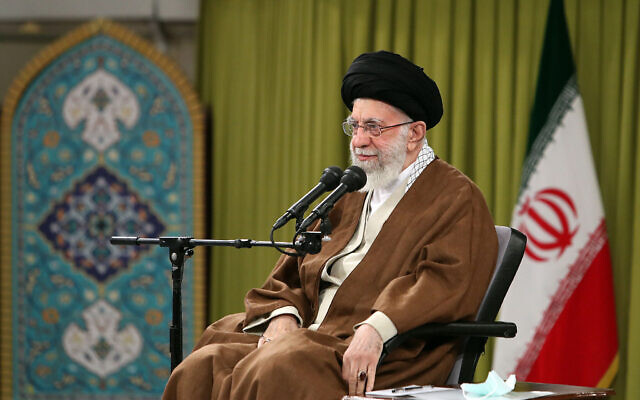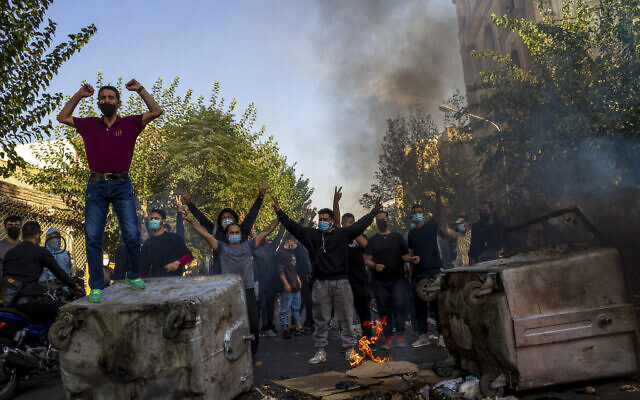When the children of the Iranian elite – known locally as Aghazadeh – are loudly and publicly attacking the basic principles of the revolutionary regime and calling for international action, you know that the ruling elite is cracking and the regime could actually be heading for collapse.
This week Farideh Moradkhani, the niece of Supreme Leader Ali Khamenei, lashed out at her uncle’s regime, branding it “murderous and child-killing,” and called on the international community to stop supporting it.
In a video, uploaded by her brother in France after she was arrested in Tehran a few days earlier on unspecified charges, Moradkhani condemned the “clear and obvious oppression” of the people.
She referred to the international sanctions against the regime over its crackdown as “laughable” and expressed disappointment that the Iranian people had been left alone in their struggle.
Moradkhani justifies the current protests, under the banner of “Women, Life, Freedom” and the demand to abolish the compulsory hijab — denouncing the regime as “disloyal to any of its religious principles and ignorant of any law or rule except force and maintaining its power in any way possible.”
Get The Times of Israel's Daily Edition by email and never miss our top stories
But unlike the many high-profile women inside the country who have been posting photos of themselves bareheaded to express their support for the ongoing struggle, Moradkhani chooses, as an observant Muslim, to issue the allegation of disloyalty to Islamic principles while wearing the head covering.
NEWS
Farideh Moradkhani, the niece of Islamic Republic’s Supreme Leader, calls on international community to support Iranians.
She compares her uncle to Hitler and Mussolini.
She says Iranians will overthrow the Islamic Republic.
Her uncle has had her arrested in the past. pic.twitter.com/htjyBsnMc7
— Yashar Ali ???? یاشار (@yashar) November 27, 2022
Moradkhani has been critical of the regime for years and was arrested several times in the past. Her family, including her mother and Khamenei’s sister Badri, her cleric father Ali Tehrani, and her brother Mahmoud, have all spoken out.
But Moradkhani’s latest critique stands out for its extreme tone and content, and in being directed at Khamenei himself. It comes on the heels of Khamenei’s condemnation of the protests, which he claimed were being orchestrated by foreign enemies such as the United States and Israel.
This public criticism by Khamenei’s niece is probably the harshest by one of the Aghazadeh since the 1979 revolution.

Iran’s Supreme Leader Ayatollah Ali Khamenei speaks during a meeting with a group of Basij paramilitary force in Tehran, Iran, Nov. 26, 2022. (Office of the Iranian Supreme Leader via AP, File)
The daughters of former president Akbar Hashemi Rafsanjani, one of the leading figures of the Islamic Republic during its first three decades, have also been critical of the regime for the past 20 years, especially since the death of their father under what some consider suspicious circumstances; he also was critical of Khamenei during the last ten years of his life.
‘The protesters… are right’
Faezeh Hashemi, Rafsanjani’s 60-year-old daughter, who resides in Tehran, has also supported the current nationwide protests, describing them as the “continuation of past demands, just in a new format.”
In statements broadcast last week by Radio Farda, Radio Free Europe’s Persian language broadcaster, Hashemi, who was reportedly arrested in Tehran in late September on incitement charges, says the regime wants to crush the protests while misrepresenting them as inauthentic.
Hashemi elaborates: “This society is disappointed in reforms in the Islamic Republic, and the ruling body also cannot adjust itself to the new generation, and this issue has led the protesters to conclude that they [the regime] should not rule anymore, and, in my opinion, they are right!”
Like Moradkhani, Hashemi believes the regime has deviated from its course and become “a dictatorship for the sake of its own survival.” Hashemi goes even further in one recently exposed audio clip. “The shah was cruel,” she says, “but the Islamic Republic – namely us – has done so much more [harm] that it makes the shah look good.”
Hashemi was Tehran’s representative at Iran’s Majlis parliament in the mid-1990s and was jailed for six months for participating in 2009 protests following that year’s disputed presidential election. IN 2018, Hashemi stated publicly that the only reason there had not been regime change was public uncertainty over who would take over.

Iranians protest the September death of 22-year-old Mahsa Amini after she was detained by the morality police in Tehran, October 27, 2022. (Photo taken by an individual not employed by the Associated Press and obtained by the AP outside Iran, Middle East Images/AP)
Hashemi and Moradkhani are not alone in their openly expressed disillusionment and opposition to the regime. Another important Aghazadeh, Hassan Khomeini, the 50-year-old grandson of Ayatollah Khomeini, has been criticizing it for the past two decades. In 2018, he warned, “Continuous social fragmentation, spreading hatred, grudge, hypocrisy, double standards and dishonesty is a bad sign for the government.” Last year, he was reportedly dissuaded by Khamenei himself from submitting his candidacy for the Council of Experts. Since then, he has been quiet.
Despite the criticisms and public outcry, Iran’s rulers have not completely cut ties with these Aghazadeh. In mid-November, for instance, it was confirmed that Fatemeh Hashemi, Faezeh’s sister, had met with Mojtaba Khamenei, the son of the Supreme Leader, though she denied having discussed the ongoing protests.
Moradkhani’s trenchant criticism of the regime and, especially, her direct attack against her uncle himself might inspire other Aghazadeh to get out of their comfort zone and join the young generation in their struggle for freedom.
With their support, along with that of Iranian celebrities, the ongoing protests could yet enter a new phase — one that might spell the beginning of the end of this Islamic dictatorship in Iran.


